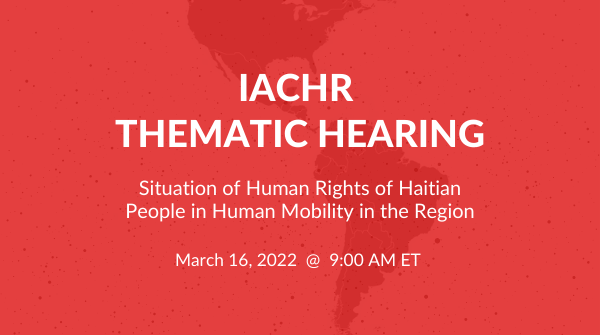KINGSTON – On March 16, 2022, at 9:00 AM (ET), the Inter-American Commission on Human Rights will hold a virtual hearing on the Situation of Human Rights of Haitian People in Human Mobility in the Region. The hearing was requested by Freedom Imaginaries, in collaboration with Centre de Réflexion et de Recherche sur la Migration et L’environnement, Haitian Bridge Alliance, Haiti Support Group – Guyana, Nègès Mawon, and Nou Pap Dòmi, among others. The purpose of the hearing is to provide testimony on the escalating cycle of migration-related abuses and torture that Haitian migrants face on their long and hazardous journey across the Americas.
The timeliness of this hearing cannot be overstated. In the past year, there has been an intensification in the migration of Haitians across the Americas in dangerous and inhumane conditions. Some of these migrants are fleeing the significant political turmoil and natural disasters in Haiti in 2021. However, many are part of a generation of Haitians who migrated after the 2010 earthquake to states such as Brazil and Chile, and who are moving farther north as conditions in these states grow increasingly inhospitable.
In response to these migration flows, states across the Americas have initiated brutal measures of repression and deterrence designed to discourage new arrivals of Haitian migrants. These measures, in turn, have given room to abusive practices on the part of criminals and unscrupulous state officials who seek to exploit the situation for personal gain. The result is an escalating cycle of abuse and torture against Haitian people in mobility in the region. The most frequently reported abuses include various forms of violence and discrimination, including sexual and gender-based violence, extortion, disappearances, and unidentified remains; criminalization and detention of Haitian migrants in inhumane conditions; and summary expulsion without access to asylum procedures.
While the situation of Haitian migrants in North and Central America is increasingly well-documented, the situation in the CARICOM region has largely been ignored by regional and international human rights mechanisms, even as conditions rapidly deteriorate.
Under the Revised Treaty of Chaguaramas, Haitian nationals, as CARICOM nationals, are entitled to the right of hassle-free entry and an automatic six-month stay upon entry into a CARICOM member state. However, a number of CARICOM states have arbitrarily stripped Haitian migrants of this right, exposing them to flagrant violations of their human rights.
In Guyana, for example, the government has adopted repressive measures that target Haitian migrants for discriminatory treatment, including detention in inhumane conditions. In 2020, for example, a group of 26 Haitians, including children, was arbitrarily arrested and detained for over one month after legally entering Guyana by air. In early 2021, a Haitian couple was reportedly arrested within hours of crossing the Lethem border into Guyana and detained for over two weeks in deplorable conditions before being brought before a Judge. One of them was reportedly held in a filthy cell with human feces on the floor and no mattress. The Haitian couple was subsequently fined and sentenced to one year imprisonment and deportation for failing to secure an entry stamp in their passport.
Other Haitian migrants report being returned to their port of embarkation after landing at the airport in Guyana. Yet others describe being abused and exploited by a network of criminals and state authorities who take advantage of their vulnerable situation. These incidents unfold in the context of a rising tide of racist and xenophobic rhetoric in Guyana and other CARICOM states that stigmatizes Haitian migrants as undesirable.
The issues facing Haitian migrants in the Americas are not isolated or idiosyncratic. Rather, they are structural and form part of a wider context of anti-“Black” racism that normalizes the persecution of “Black” migrants in every corner of the world, from the United States to Ukraine, where “Black” Ukrainian refugees report facing discrimination and inhumane treatment as they try to flee a brutal war.
These issues are also intersectional since “Black” migrant women and girls are particularly vulnerable to egregious violations of their human rights. In the Darien Gap jungle, for example, where many Haitian and other migrants cross on their way to the United States, sexual violence is increasingly and intentionally used by criminal gangs as an instrument of terror. Between January and September 2021, UNICEF registered 29 reports of sexual abuse of adolescent girls during the journey. Many more women have reported sexual abuse.
The Dominican Republic provides another stark example of the intersectional dimensions of migration-related abuse. Human rights bodies have expressed concern about the expulsion of pregnant women, mainly of Haitian origin or descent, from the Dominican Republic without the State taking into account the women’s need for humanitarian protection. According to civil society organizations, pregnant women in the Dominican Republic have been the target of migration authorities who carry out migration control operations in hospitals that report large influxes of pregnant migrant women, mainly of Haitian origin or descent. The aim of these operations is to expel the women in question from the Dominican Republic.
The upcoming hearing will confront these issues and call for urgent action to ensure the rights of Haitian people in human mobility across the Americas.
The public can follow the hearing live on the following IACHR platforms:
Register via Zoom.
Watch live on Facebook or YouTube.
The IACHR is a principal and autonomous organ of the Organization of American States whose mission is to promote and protect human rights in the American hemisphere.

